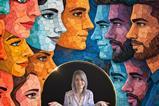Isabelle Kohler reflects on how generative artificial intelligence can affect our lives – from helping us write Sinterklaas poems to impacting the quality of our education system.

Last week, the Netherlands celebrated Sinterklaas!
I discovered the Dutch tradition of celebrating Sinterklaas when I arrived in the country for my postdoctoral fellowship. I have fond memories of those times – the poems, surprise gifts, and of course eating a lot of pepernoten, kruidnoten and speculaas. Although I didn’t grow up in the Netherlands, I’m pleased with how well I’ve integrated into Sinterklaas festivities: I even attended the Sinterklaas parade last year in Hellevoetsluis.
This year’s Sinterklaas was another extraordinary edition: for the first time, I received a poem composed by ChatGPT, OpenAI’s generative artificial intelligence (AI) system. And it was impressive.
Last year, I wondered whether people would use generative AI to write their Sinterklaas poems. At that time, ChatGPT was a nascent technology, so I can imagine that only the early adopters used it for their poems. This year, things are different. With its incredibly rapid advancement, it wouldn’t surprise me if many of you also received poems crafted by ChatGPT (confirmed or suspected).
I have mixed feelings about generative AI. On one hand, I understand the benefits it provides. I’m fascinated by the quality of the texts, images, videos, or sounds generated by AI tools. I also use ChatGPT and others as ideation tool and to enhance my writing. On the other hand, I’m already tired of the numerous unaltered, AI-generated articles and posts I see on (social) media. I find this uninteresting and uninformative. It also lacks the human touch. More importantly, it alarms me to see how content can be delivered without fact-checking and critical thinking.
As a university lecturer, I recognize the potential that generative AI can bring in education. However, I do worry about its impact on students’ fundamental understanding and critical thinking skills. I’m actually not only worried about the impact of generative AI on students’ understanding, but on education quality in general.
A few days after Sinterklaas, the OECD released the 2022 findings of the Programme for International Student Assessment (PISA) [1]. PISA is an annual global study that evaluates educational systems by measuring 15-year-old students’ performance on mathematics, science, and reading. If you read it, you saw that Dutch schoolchildren don’t perform at satisfactory levels:
- The knowledge and skills of Dutch 15-year-olds in mathematics, reading, and science have significantly declined over the past four years.
- Dutch students perform well in mathematics, ranking highest among EU14 countries and above the OECD average. However, in 2022, their reading skills fell below the OECD average, marking the lowest performance among nearly all EU14 countries.
- A quarter of students are insufficiently literate in mathematics and science, and a third in reading. This indicates that a significant portion of students can’t understand a text correctly and connect it to their knowledge. Essentially, one-third of the schoolchildren lack the skills needed to participate independently in society. One-third!
You might think that this is probably the effect of the COVID-19 pandemic. Unfortunately, the decline was already present in the years before. There seems to be something fundamentally wrong with our educational system. And I doubt that generative AI will provide solutions.
When I see these figures, I wonder how education will evolve. Will we, as an educational system, adapt to an era increasingly dominated by AI? How will AI shape the brains of current and future generations of schoolchildren? How will it affect higher education? Will universities (and lecturers, who are already stretched to the breaking point) adapt quickly enough? How do we ensure that the technology enhances critical thinking and learning, rather than replacing it? The challenge is to integrate AI in a way that empowers students and fosters both innovation and fundamental understanding. It’s a massive challenge.
So, I asked ChatGPT-4 for some help. The answer? “To ensure generative AI enhances critical thinking and learning in education, it should be used as a complementary tool, fostering a synergy between technology and human judgment, with a strong emphasis on teaching students to critically evaluate and thoughtfully apply its outputs.”
I wish ChatGPT would take on the form of a human being and stand in front of my classes to apply this wise advice. I’d sit in the back and take notes.
Or maybe not, because I’m not too keen on being replaced by generative AI.
Sinterklaas, I’m a little late for my wish this year, but I would like to see this technology used in schools and universities in a useful way to promote a deep and fundamental understanding of basic and advanced concepts. Can this happen, please? I put an extra dose of carrots beside my shoe for your horse.
Thank you, Sint!
PS: I confess, I also wrote a poem using ChatGPT-4 this year.
References:
[1] PISA 2022 Results: Factsheet on the Netherlands, OECD, https://www.oecd.org/publication/pisa-2022-results/country-notes/netherlands-0941b029/ (accessed 11th December 2023).
If you’re interested in learning more on how to navigate academia – with or without generative AI, don’t hesitate to join the NextMinds Community! For this, you have plenty of choices: visit NextMinds website to learn more about my work, sign up to the monthly newsletter, and follow me and NextMinds on LinkedIn.


















Nog geen opmerkingen